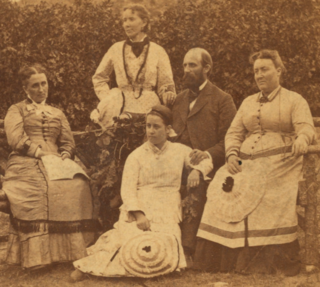Related Research Articles

Polygyny is a form of polygamy entailing the marriage of a man to several women. The term polygyny is from Neoclassical Greek πολυγυνία (polugunía); from Ancient Greek πολύ (polú) 'many', and γυνή (gunḗ) 'woman, wife'.
Polygamy is the practice of marrying multiple spouses. When a man is married to more than one wife at the same time, it is called polygyny. When a woman is married to more than one husband at the same time, it is called polyandry. In sociobiology and zoology, researchers use polygamy in a broad sense to mean any form of multiple mating.

Polygamy was practiced by leaders of the Church of Jesus Christ of Latter-day Saints for more than half of the 19th century, and practiced publicly from 1852 to 1890 by between 20 and 30 percent of Latter-day Saint families.

Islam is a minority religion in France that is followed by around 3 million to 5.7 million people in France, which is around 4% to 8% of the nation's population.
Conflict of marriage laws is the conflict of laws with respect to marriage in different jurisdictions. When marriage-related issues arise between couples with diverse backgrounds, questions as to which legal systems and norms should be applied to the relationship naturally follow with various potentially applicable systems frequently conflicting with one another.
Polygamy is the practice of having more than one spouse at the same time. Specifically, polygyny is the practice of one man taking more than one wife while polyandry is the practice of one woman taking more than one husband. Polygamy is a common marriage pattern in some parts of the world. In North America, polygamy has not been a culturally normative or legally recognized institution since the continent's colonization by Europeans.

A referendum on becoming an overseas department of France was held in Mayotte on 29 March 2009. Mayotte had been a departmental collectivity of France since 2001. In contrast to the four other similar regions, Mayotte would not have become an Overseas Department (DOM) or an Overseas Region (ROM), but would only have had a single assembly; the four other existing DOM/ROM will have the option of changing their status to this format as well.

Polygamy, including polygyny, is outlawed in India. While it was not prohibited in Ancient India and was common among aristocrats and emperors, it is believed that it was not a major cultural practice. The lack of prohibition was in part due to the separation between land laws and religion, and partially since all of the major religions of India portrayed polygamy in a neutral light.
As Yemen is a mostly-Muslim nation, polygamy is lawful. Polygamy is permissible in Islam up to four wives, as long as the husband devotes equal attention to each of them.

Under civil law, Nigeria does not recognize polygamous unions. However, 12 out of the 36 Nigerian states recognize polygamous marriages as being equivalent to monogamous marriages. All twelve states are governed by Sharia law. The states, which are all northern, include the states of Bauchi, Borno, Gombe, Jigawa, Kaduna, Kano, Katsina, Kebbi, Niger, Sokoto, Yobe, and Zamfara which allows for a man to take more than one wife.
Polygamy is legal in Uganda, where a man is allowed to marry multiple wives at a time. Due to this, most families tend to contain an abundance of children.
The practice of what is usually called polygamy, enjoys de facto and de jure legality in Kenya. It is to be understood as polygyny, however.
Polygamous marriages are not recognized in the Russian Federation. The Family Code of Russia states that a marriage can only be contracted between a man and a woman, neither of whom is married to someone else. Furthermore, Russia does not recognize polygamous marriages that had been contracted in other countries. Under Russian law, de facto polygamy or multiple cohabitation in and of itself is not a crime.
The Republic of Afghanistan, which is an Islamic Republic under Sharia Law, allows for polygyny. Afghan men may take up to four wives, as Islam allows for such. A man must treat all of his wives equally; however, it has been reported that these regulations are rarely followed. While the Qur'an states that a man is allowed a maximum of four wives, there is an unspecified number of women allowed to be his 'concubines'. These women are considered unprotected and need a man as a guardian.
Polygamy is legal in Indonesia, the largest Muslim population in the world. Polygamy in Indonesia is not just practiced by Muslims, but also customarily done by non-Muslim minorities, such as the Balinese and the Papuans.
Polygamous marriages are legally recognized for men in Saudi Arabia, in accordance with Islamic Sharia law, which allows for Muslim men to marry up to four wives, provided that he treats them equally and shares all his wealth equally. However, attitudes towards polygamy in Saudi Arabia have changed in recent decades and became very rare to practice it in the present times.
The legal status of polygamy varies widely around the world. Polygyny is legal in 58 out of nearly 200 sovereign states, the vast majority of them being Muslim-majority countries. Some countries that permit polygamy have restrictions, such as requiring the first wife to give her consent.
Polygamy is not legally recognised in Australia. Legally recognised polygamous marriages may not be performed in Australia, and a person who marries another person, knowing that the previous marriage is still subsisting, commits an offence of bigamy under section 94 of the Marriage Act 1961, which carries a maximum penalty of 5 years imprisonment. However, the offence of bigamy only applies to attempts to contract a legally recognised marriage; it does not apply to polygamous marriages where there is no attempt to gain recognition for the marriage under Australian law. Whether or not either or both partners were aware of the previous subsisting marriage, the second marriage is void. Foreign polygamous marriages are not recognized in Australia. However, a foreign marriage that is not polygamous but could potentially become polygamous at a later date under the law of the country where the marriage took place is recognized in Australia while any subsequent polygamous marriage is not. While under Australian law a person can be in at most one legally valid marriage at a time, Australian law does recognise that a person can be in multiple de facto relationships concurrently, and as such entitled to the legal rights extended to members of de facto relationships.
Polygamy and civil polygamous marriages are legal in Bangladesh but restricted according to a law of 1961, though the practice is rapidly declining. According to a Pew Research Center study, less than 1% of Bangladeshi men are in polygamous marriage, much lower than the average rate found in other nations that permit polygamy. Certain cities have also placed hefty taxes on the practice of polygamy, with the tax increasing per each new wife the man takes. A Bangladeshi Muslim man can marry up to four wives at the same time but must have permission from existing wives. There is no known limit for the number of wives a Hindu man can take in Bangladesh.
Polygamy is the practice of having more than one spouse at the same time. Specifically, polygyny is the practice of one man taking more than one wife while polyandry is the practice of one woman taking more than one husband. Polygamy is legal in Malaysia in the form of polygyny, that is, between one man and up to four wives. Special permission from an individual state's Syariah Court is required for each marriage after the first by fulfilling the requirements needed by the state's Syariah Law.
References
- ↑ "France's Polygamy Problem | DW | 31.07.2005". Dw.com. Retrieved 23 February 2022.
- ↑ "Polygamie : 20.000 familles en France ?". Francetvinfo.fr. 1 November 2011. Retrieved 23 February 2022.
- 1 2 "French minister says polygamy to blame for riots". Ft.com. 15 November 2005. Retrieved 23 February 2022.
- ↑ "Many Wives' tales," The Economist, May 8–14, 2010, p. 55
- ↑ Scolino, Elaine (2005-11-18). "Immigrant Polygamy Is a Factor in French Unrest, a Gaullist Says". The New York Times . Retrieved 22 October 2016.
- ↑ "Polygamy banned but some immigrants in France use system to make money on their wives". Fox News . 27 March 2015.
- ↑ "In France, Veil Fracas Sparks Polygamy Storm". Cbsnews.com. Retrieved 2021-03-22.
- ↑ Samuel, Henry (2020-12-09). "Forced marriages and polygamy among targets of French law tackling radical Islamism". The Daily Telegraph . ISSN 0307-1235 . Retrieved 2021-03-22.
- ↑ "French assembly passes bill ensuring 'French values,' banning polygamy, forced marriage". Cbc.ca. Retrieved 2021-03-22.
- ↑ "French island of Mayotte votes to change in status". Google.com. Archived from the original on April 6, 2009. Retrieved 23 February 2022.